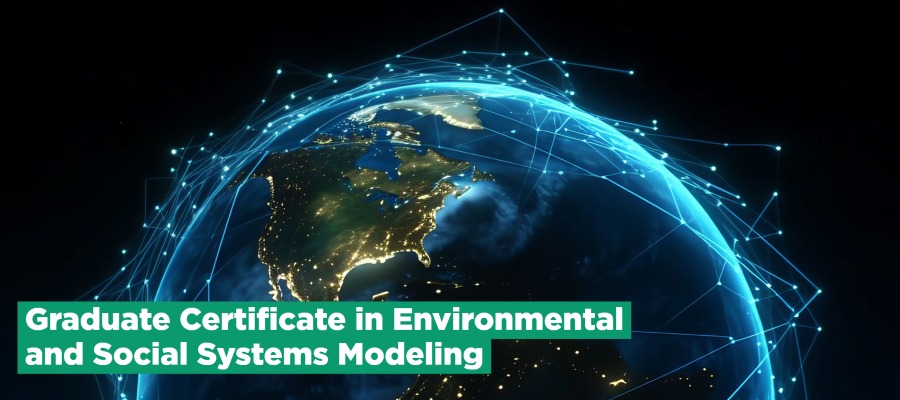Graduate Certificate in Environmental and Social Systems Modeling

Understanding and responding to complex global environmental changes is a major challenge for policymakers and academic researchers alike. Modeling is a useful tool to tackle these complex issues and study coupled human and natural systems at a variety of spatial and temporal scales. Existing curricular structures emphasize disciplinary approaches resulting in a tendency to view analytical and computational modeling techniques as domain-specific, however. As a result, students are often unaware of the diversity of modeling tools available and how to utilize them to address environmental issues, which limits their ability to apply the most appropriate methodology to a given problem. To address these challenges, a core group of faculty in the Environment and Science Policy Program (ESPP) at Michigan State University (MSU) has established an educational cluster around modeling techniques for addressing socio-environmental issues in complex systems. This module of courses exposes students to cutting-edge techniques, including environmental modeling, agent-based modeling, system dynamics modeling, participatory model-building, hierarchical linear modeling, and structural equation modeling. Our objective is to build a solid foundation in the theory of models and complex systems and provide hands-on experience with model design, development, and evaluation geared toward specific research topics across disciplines. The coursework culminates in an interdisciplinary team-taught capstone seminar on case-based group research that will address a selected practical policy problem using an ensemble of appropriate modeling tools.
Application for the Graduate Certificate in Environmental and Social Systems Modeling
Modeling Certificate Intent to Enroll Form
ESPP asks that students disclose any use of generative AI in the preparation of any materials for our program. We feel strongly that this practice is a critical part of working together to engage with these tools in higher education. A list of permissible and non-permissible uses of generative AI at MSU can be found here (https://ai.msu.edu/guidelines).
Please note that applications for the Fall Semester are due February 1 and applications for the Spring Semester are due October 15.
Other Important Environmental and Social Systems Modeling Forms
Modeling Certificate Completion Review Form
Requirements for the Graduate Certificate in Environmental and Social Systems Modeling
| Students must complete 9 credits from the following: | ||||||||
| 1. | Both of the following courses (3 credits): | |||||||
| ESP | 850 | Introduction to Environmental and Social Systems Modeling | 1 | |||||
| ESP | 890 | Modeling Environmental and Social Systems | 2 | |||||
| 2. | Two of the following courses (6 credits): | |||||||
| CSUS | 836 | Modeling Natural Resource Systems (cross-listed as ESP 836) | 3 | |||||
| GEO | 869 | Agent-Based Modeling (cross-listed as ESP 869) | 3 | |||||
| PLS | 900 | Research Seminar in Political Methodology | 3 | |||||
| ENE | 801 | Dynamics of Environmental Systems | 3 | |||||
ESP 850 provides students with the theoretical background to understand the diversity of modeling problems arising from coupled human and natural systems. Through exposure to diverse modeling approaches, students learn to discern which modeling tool is most appropriate in a variety of contexts. ESP 890 is a capstone course that involves a modeling project addressing a real-world environmental problem, supervised by one or more of the coordinating faculty. Its aim is to teach students how to apply the theories and methodologies from previous modeling courses to practical policy problems.
Between completion of ESP 850 and ESP 890 are four possible elective courses, CSUS 836, GEO 869, PLS 900, and ENE 801. Students complete two of these modeling electives. It is highly recommended that students should talk with the certificate coordinator Dr. Arika Ligmann-Zielinska (arika@msu.edu) before taking these courses to ensure course content offered by different instructors are suitable for the certificate.
- Relying heavily on systems-dynamics modeling, CSUS 836 introduces quantitative modeling approaches as tools for students interested in addressing real-world problems in complex environmental systems. Students learn to identify the characteristics and behavior of complex systems, articulate the steps involved in formulating a research question and building a model to address it and construct quantitative, dynamic models with appropriate, data-derived relations between variables.
- GEO 869 focuses on theoretical concepts related to simulating complex systems. The course provides hands-on experience in agent-based modeling, with a special emphasis on modeling human decision-making and its impact on the natural environment.
- PLS 900 covers hierarchical linear modeling and structural equation modeling, providing necessary skills for critically evaluating contemporary research and utilizing these techniques in independent research. Students learn to effectively communicate advanced statistical concepts and understand and evaluate the application of these methods to a variety of social and environmental issues and behavior across multiple spatial scales.
- ENE 801 is an environmental modeling class focused on applying science and engineering principles to describe contaminant transport in natural and engineered systems. Building on basic concepts of conservation laws, reaction kinetics, and equilibria, the class begins by describing the main concepts behind reactor design and engineering and their application to environmental modeling. A major focus of the second half of the class is on fluid flow to describe pollutant transport in environmental media (water, air, soil) at multiple scales and across environmental interfaces.
For more information, contact Arika Ligmann-Zielinska at arika@msu.edu.

